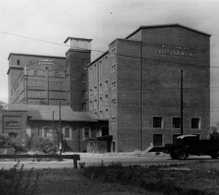Kiesekamp
| Mühlenwerke F. Kiesekamp AG
|
|
|---|---|
| legal form | Stock company (1925–1943) |
| founding | 1835 as a sole proprietorship |
| Seat | Albersloher Weg 14, Münster |
| management | F. and W. Kiesekamp (until 1914) |
| Number of employees | 80 (1907) |
| Branch | Flour mill |
The Mühlenwerke F. Kiesekamp were a German milling companies , which existed from 1835 to 1974.
history
In 1835 Ferdinand Kiesekamp built a mill on Münzstrasse in Münster . The " Kiesekamp'sche Mühle " was powered by a steam engine from the steelworks union and dealership Jacobi, Haniel and Huyssen . In 1854 his son Wilhelm Kiesekamp (1836–1914) took over the business.
In 1883 Kiesekamp secured a factory site directly on the planned Dortmund-Ems Canal and in 1886 bought another site on Albersloher Weg. In 1891 he moved the mill to the future urban port area . The port basin of the port, which was inaugurated in 1899, ends a few hundred meters away, so that a transport bridge had to be built over the Albersloher Weg. With 80 workers, the company was one of the German large mills in 1907.
Kommerzienrat Wilhelm Kiesekamp, married to the writer and singer Hedwig Kiesekamp, née Bracht , since 1864 , was one of the wealthiest merchants in Münster at the time. He had a representative villa built for himself and his family on Hüfferstraße, which had had its first telephone connection in Münster since 1884 and was the focus of cultural life in the Westphalian metropolis for decades. From 1889 to 1913 Kiesekamp was President of the Chamber of Commerce and Industry of the Münster administrative district . In 1893 he also took part in the Thabena Farming Association Ltd. founded by Heinrich Schulte-Altenroxel . in South Africa .
After Wilhelm Kiesekamp's death in 1914, the company was initially continued as " F. Kiesekamp limited partnership ". On February 7, 1925, a stock corporation was founded with a capital of 3 million marks. On February 27th, it took over F. Kiesekamp KG's mill works along with the associated land, buildings and machines under the new company " Mühlenwerke F. Kiesekamp Aktiengesellschaft ". As a result of the world economic crisis , the capital was reduced to 2 million marks on May 25, 1934. Board members were Wilhelm F. Schaub, Adolf Jünger, Hermann Kißler , Johannes Loest, Karl Wille and Gustav Wichtermann. The last ordinary general meeting of the stock corporation took place on February 25, 1943. Shortly afterwards, both the villa in Hüfferstraße and the manufacturing and storage buildings at the port were destroyed in the air raids on Münster during World War II.
1949–1950 the company buildings at the port were rebuilt according to plans by Heinrich Bartmann . The flour production was stopped in 1956, while the concentrate production continued until 1974. In 1982 there was a successor company under the name " DMV Lagerei und Verwaltungsgesellschaft mbH ". In 1997 the mill buildings were finally demolished.
Culture of remembrance
- In Münster the streets Kiesekampweg and Kiesekamps Mühle were named after the entrepreneurial family.
Written sources
- Helene Albers and Ulrich Pfister (eds): Industry in Münster 1870-1970 , Dortmund 2001, ISBN 978-3-925-22743-1
- Hartmut Dietz: Wilhelm and Hedwig Kiesekamp, Commerce and culture towards the end of the 19th century in Münster , Westfälische Reihe, Münster 2016, ISBN 978-3-956-27462-6
- Handbook of German stock corporations , Hoppenstedt , Berlin 1943
Web links
Individual evidence
Coordinates: 51 ° 57 '0.5 " N , 7 ° 38' 12.4" E




